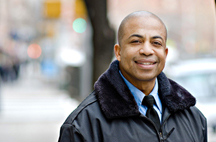A Teacher of Life Skills
Chambers, an immigrant from the Jamaican West Indies who came to
"As an immigrant I saw a lot of disparities for people of color and immigrants in this society," he says. "Martial arts helps me cut across barriers to communicate with different people."
A few years later, with the help of a few friends, he opened his own school, Zen Masters, in Queens, so he could teach not just martial arts but also life skills and conflict management to other people in his community dealing with difficult social issues. Chambers chose the school's name to reflect that students develop more than just the physical; they are also developing the mind of a Zen master-'"one who holds both an expert state of mind as well as a beginner mind. "It's about recognizing that things are not always absolute, but are ever-evolving and fluid," Chambers says.
Chambers also says that martial arts practice offers young people structure. "Kids really value structure and consistency-'"what is today is the same tomorrow. I try to embody that." As a result, his program has attracted, among others, students who are failing in school as well as potential runaways seeking advice. Parents come to him, too, as do schools with gang problems and kids being preyed upon.
Chambers eventually continued the school on his own, moving to a larger building. In addition to martial arts classes, Zen Masters now offers an after-school program on weekdays. After being picked up at their school by a bus that Zen Masters provides, the students finish their homework, which is then checked by the teachers. In addition to learning chess and martial arts, the students participate in three training programs-'"conflict resolution, how to pick a friend (including the concept of what a friend is), and empathetic behavior, in which they are taught to understand their feelings and emotions. "We also have classes where the kids can just talk about what they are experiencing," Chambers says. "I mediate the conversation, and the other kids in the group talk about how they would deal with what is being discussed. My role is to help the kids have more responsibility in managing that process as they get older."
The Zen Masters summer program continues the focus on conflict management while also introducing a general educational theme. Last year, the theme was science with the young people dissecting worms, learning about botany and physics, and going on field trips to the
In addition to working with the school's students, Chambers also helps its counselors, many of whom are college students, to be supportive of each one another and to work effectively as a team. "If they are not having fun, the kids are not going to have fun," he says. "We want the whole experience to be positive."
He credits his wife, Sharon, who holds a master's degree in Organizational Psychology from TC, with being the glue that holds everything together. She not only runs the business, but is also a student in martial arts.
Chambers has drawn on TC in a number of ways. After the College provided him with used computers that would otherwise have been discarded, Chambers began teaching computer classes at Zen Masters to his students and their parents. TC students studying nutrition and conflict resolution gave seminars at the school. Chambers himself has been able to draw on TC directly by acquiring a wealth of knowledge during his pursuit of two master's degrees-'"in Organizational Psychology (1999) and in Health Education (2002)-'"and an Ed.D. in Adult and Organizational Learning.
Currently, he is writing his dissertation on the impact of emotions on learning. "If the capacity to learn is being stifled by experiences, emotions or circumstances, then that's a problem," he explains. "I see a lot of kids who have been placed in special education classes because of emotional issues, yet in my class they are exceptional."
Chambers finds that public schools are often not equipped to manage emotions displayed by kids in the classroom. His program is designed to help young people learn about themselves and others and to manage their emotions. "In martial arts, it's not just about controlling emotion, but understanding it," he says. "If emotions are harnessed and understood, it can lead to a positive outcome."
In the greater community, Chambers trains martial arts teachers in conflict resolution and has worked with the
Chambers has also given back to TC in many ways. He was Co-Chair of the1999 TC Diversity Task Force with Professor Peter Coleman. "Dennis' strong relationships with people in virtually every department at the College made our work possible," Coleman says. "He also brought a thoughtful, centered presence to our group."
He eulogized Ennis Cosby, who was a student at TC when he was killed in 1997, at a memorial service held by the College, and Chambers also spoke at former President Arthur Levine's inauguration ceremony-'"something he had trouble finding the nerve to do at first.
"I didn't want to speak in public, but a young girl I was teaching changed that." Chambers says the girl was having trouble learning to do a flying kick because she was afraid she would fall. He gently told her to face her fears rather than letting her fears conquer her. "I realized, when I said that to her, that I had to do the same."
"My students have told me at times that I am their role model," Chambers says. "But they are the ones that motivate me because of their thirst and hunger to learn under difficult circumstances." He says they also are the ones to whom he has promised that he will get his doctorate. "They ask me, -'Sir, this year?,' because they all want to come and watch."
Published Wednesday, Jan. 24, 2007
